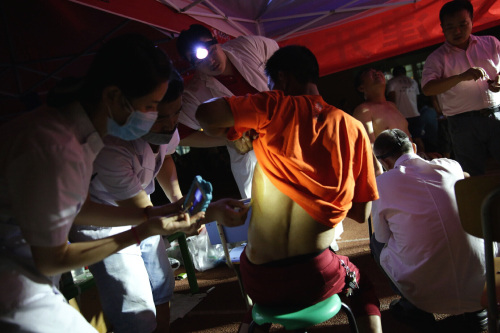
Doctors tend to the wounded in a makeshift clinic located within the No. 2 Elementary School of the Binhai New District Development Zone in Tianjin on August 13 (XINHUA)
The aftermath
The concerns of possible health threats are a real concern, most notably whether the hazardous materials have polluted the air and water in the area.
Hours after the explosion, the Tianjin Municipal Environmental Protection Bureau immediately began to monitor air and water quality, setting up 34 temporary monitoring stations for air and five for water. The water discharge portal to the sea has been closed.
Data on August 13 showed that the air quality remained within the normal range in the region near the warehouse. Epoxyethane, a harmful gas that could lead to cancer, in the most polluted area has stayed below 2 milligrams per cubic meter, compared with the stipulated hazardous level of 5 milligrams per cubic meter.
The marine monitoring results based on 177 seawater sample tests also showed that no hazardous chemicals were detected in water flowing from the blast site.
However, on August 18 volatile phenol, a toxic substance, as well as minute traces of sodium cyanide, were detected in water samples collected near Tianjin Port for the first time, according to the State Oceanic Administration.
The explosions also stoked concerns about dragging down the booming growth of the Tianjin Binhai New Area, a key industrial park that has made Tianjin one of China's fastest growing areas. The port of Tianjin also acts as a gateway from north China to the rest of the country, shipping roughly 40 percent of imported cars inland across the nation.
Responding to this, Huang, the mayor, said that the damage caused by the disaster needs further assessment, but would not affect the fundamentals of Tianjin's economy.
"The areas affected by the blasts only have 176 companies, most of which do not run import-export business," said Huang.
Social media has been awash with rumors following the explosion. On some Sina Weibo (microblog) accounts and the instant messaging service platform WeChat, comments like "toxic gas blown to Beijing," "malls and markets looted," and "no one survived within 1 km of the blast site" were commonly encountered.
Some accounts also masqueraded as being from relatives of the victims, attempting to swindle money through fraudulent charity fundraising.
According to the Cyberspace Administration of China (CAC), some celebrity bloggers posted "irresponsible" comments about the blast, causing their followers to panic by comparing the blast to the atomic bombs dropped on Hiroshima and Nagasaki in Japan during WWII.
"We take a zero-tolerance attitude toward websites spreading rumors after major disasters," announced the CAC on August 16.
In an effort to tighten up control of dangerous chemicals and explosives, the State Council sent out an emergency notice on August 14, asking governments at all levels to reinforce the safety management of dangerous chemicals and explosives, strictly control the access threshold for industrial projects on these materials, and firmly implement special regulatory measures for highly toxic chemicals such as cyanide, as well as inflammable and explosive materials.
The notice says that the blast also revealed other problems, including the inadequate safety management of dangerous materials at ports, irregular practices among workers, weak emergency responses to incidents and lax supervision by authorities.
Since January, a series of accidents attributable to lax safety management in workplaces have occurred at quite a few locations across China.
On January 31, a plant in Linyi, Shandong Province, was hit by a blast during an overhaul of the plant's equipment, killing four and injuring two others.
On June 10, a chemical factory in Yiwu of Zhejiang Province went up in flames after a tank containing methanol and acetic acid exploded.
On August 16, four days after the blast in Tianjin, a warehouse storing rubber and wood in Qingdao, a coastal city also located in Shandong, suffered a similar accident.
On August 17, China's industrial authorities demanded safety inspections on commercial explosive firms and ordered local regulators to conduct thorough safety checks on entities that deal with commercial explosives, with a focus on storage and safety regulations.
In line with this, Beijing has ordered inspections of all manufacturers or enterprises that deal with dangerous goods.
"The city's work safety department will inspect all manufacturers and explosive-product enterprises," said Zhang Yankun, Vice Mayor of Beijing, on August 13.
Shanghai also launched widespread work safety inspections targeting enterprises involved in the production, operation, storage and transport of hazardous chemicals, inflammable materials and explosives.
Sunriow, a logistics company based in the Pudong New Area in Shanghai, which stores combustible and toxic materials, including essences and fragrances, was found to be storing products improperly under required categories during an inspection after the Tianjin blast.
Issues were also found with Givaudan Fragrances (Shanghai), a Swiss manufacturer of flavors and fragrances, which was found to be storing excessive quantities of hazardous chemicals.
"The inspections aim to achieve full coverage, zero tolerance, strict enforcement and be effective," said Zhou Bo, Vice Mayor of Shanghai.


















































